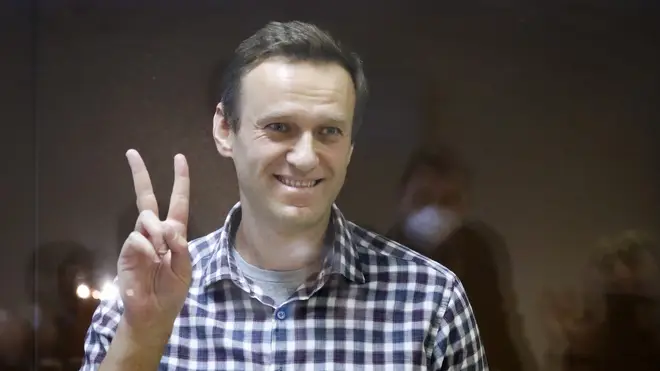
Matt Frei 10am - 1pm
2 September 2021, 17:24

Companies warned that failure to remove the Smart Voting app could be seen as interference in Russian elections.
Apple and Google have been warned by Russia’s state communications watchdog that they could face fines over an app created by allies of jailed opposition leader Alexei Navalny.
The agency, Roskomnadzor, said their failure to remove Mr Navalny’s app from their stores could be seen as interference in Russian elections.
Mr Navalny’s app promotes his Smart Voting strategy — a project designed to support candidates who are most likely to defeat those from the Kremlin’s main United Russia party.
Russian opposition supporters, independent media and human rights activists have faced increased government pressure in the run-up to the September 19 parliamentary election.

Mr Navalny’s allies have linked the crackdown to the Kremlin’s effort to steamroll the opposition and try to preserve a dominant position for United Russia.
In June, a Russian court outlawed Mr Navalny’s Foundation for Fighting Corruption and a network of his regional offices as extremist organisations. This ruling barred people associated with the groups from seeking public office and exposed them to lengthy prison terms.
On Thursday, police in the southern city of Rostov-on-Don detained an activist who posted a Smart Voting sticker on her Instagram account, and a local court quickly handed her a five-day jail sentence on charges of propagating extremist symbols.
The activist, Bella Nasibyan, was detained after she took her three-year-old son to a nursery.
Over the past few weeks, police across Russia have visited hundreds of people whose names were in a leaked database from websites set by Mr Navalny’s allies to push for his release and promote his Smart Voting strategy.
The police action appeared to be part of authorities’ efforts to intimidate opposition supporters before the election.
Russian authorities also blocked 50 websites run by his team or supporters for allegedly disseminating extremist group propaganda, and targeted his top associates.
Russian authorities also blocked 50 websites run by his team or supporters for allegedly disseminating extremist group propaganda, and targeted his top associates.
The vote on September 19 is widely seen as an important part of Russian President Vladimir Putin’s efforts to cement his rule before the country’s 2024 presidential election.
The 68-year-old Russian leader, who has been in power for more than two decades, pushed through a constitutional reform last year that would potentially allow him to hold on to power until 2036.
Mr Navalny, 45, is Mr Putin’s most determined political foe. He was arrested in January on returning from Germany, where he spent five months recovering from a nerve agent poisoning that he blames on the Kremlin — an accusation rejected by Russian officials.
In February, Mr Navalny was ordered to serve two-and-a-half years in prison for violating the terms of a suspended sentence from a 2014 embezzlement conviction that he dismissed as politically motivated.
Russian authorities have increased pressure on major social media platforms after criticising them for acting as a tool to help bring tens of thousands of people into the streets to demand Mr Navalny’s release in a wave of protests early this year.
Facebook and Twitter have been fined repeatedly for failing to remove content that Russian authorities deemed unlawful, and Roskomnadzor early this year slowed down the speed at which Twitter can operate.
Russian Foreign Ministry spokeswoman Maria Zakharova warned that Moscow would not tolerate the tech giants’ refusal to abide by the law and remove the banned content.
“Such arrogant and selective behaviour and demonstrative ignoring of repeated requests from the relevant Russian agencies regarding the content designated as extremist is particularly unacceptable in the context of the current electoral processes,” she said.
“It would be legitimate to interpret further connivance of US IT giants to the publication of the banned materials as an interference in domestic affairs of the Russian state.”